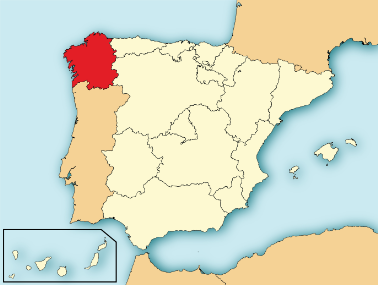EDUCATION AND THE LABOUR MARKET IN A EUROPEAN PROJECT FRAMEWORK
The regions
General Info
Galicia, Spain

Magnesia, Greece

The Region of Galicia (Spain) is characterized by its great dependence on the primary and tertiary sectors. The sea (shellfish gathering) and the tourism are the greatest economical resources in the area. The economical crisis is seriously hitting the area, especially on the above mentioned activities and on the construction field; so for many people, especially young people without a degree, it is very difficult to find their first job, and others have lost their job, with the consequent risk of social exclusion.
Noia is situated 30 kilometres far from Santiago de Compostela, and it is known as “The Compostelan Port”; due to this reason, it is an ideal place for the tourists and/or the pilgrims who visit Compostela.
More info
The regional entity of Magnesia, deriving from the tribe name Magnetes, is the name of the southeastern area of Thessaly in central Greece. The Greater Volos area is the second-largest city in Thessaly and the third busiest commercial port in Greece. Much of the population lives near the Pagasetic Gulf and in the eastern part. Magnesia includes the Northern Sporades group of islands, Skiathos, Skopelos and Alonissos. It also includes the Alonissos Marine Park. The regional entity hosts 2,000,000 tourists annually. The natural landscape of Magnesia consists of wooded mountains, cultivated flat land, and coastline. One of the area's main elements is the Pelion mountain range, which is located in the eastern region of the Prefecture and forms the eastern edge of the Pagasetic Gulf. The dense Mt Pelion track network, the archaeological sites, the traditional settlements, the handicraft trades, the little steam train of Pelion, the Ski Centre in Agrioleukes, the variety of beaches in the Aegean Sea and in the Pagasitikos Gulf, create an appropriate environment for the development of marine and mountain tourism, in combination with ecological, educational, sport and cultural activities.
Volos is the newest of the Greek port cities, with a remarkably large proportion of modern buildings, erected in the wake of the catastrophic earthquakes of 1955. The economy of the city is based on manufacturing, trade, services and tourism. There is also a rich Industrial heritage with buildings that date back to the 19th century and demonstrate the long standing industrial and commercial tradition of Magnesia. However, recession has hit the area hard and the unemployment figures have risen in the last few years, as one after the other big factories closed in the town's industrial zone.
More info